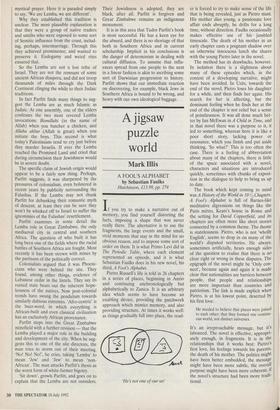A jigsaw puzzle world
Mark Illis
A FOOL'S ALPHABET by Sebastian Faulks Hutchinson, .03.99, pp. 274 If you try to make a narrative out of memory, you find yourself distorting the facts, imposing a shape that was never really there. The alternative is to use the fragments, the large events and the small, vivid moments that stay in the mind for no obvious reason, and to impose some sort of order on them. It is what Primo Levi did in The Periodic Table, where each element represented an episode, and it is what Sebastian Faulks does in his new novel, his third, A Fool's Alphabet.
Pietro Russell's life is told in 26 chapters in a series of places, beginning in Anzio and continuing unchronologically but alphabetically to Zanica. It is an arbitrary idea which seems to have become an enabling device, providing the patchwork approach which mimics memory, and also providing structure. At times it works well: as things gradually fall into place, the read- 'He's not one of our set' er is forced to try to make sense of the life that is being revealed, just as Pietro must. His mother dies young, a passionate love affair ends abruptly, he drifts for a long time, without direction. Faulks occasionally makes effective use of his jumbled timescale. The death of his mother in an early chapter casts a poignant shadow over an otherwise innocuous lunch she shares with the young Pietro later in the novel.
The method has its drawbacks, however. In isolation there is a slightness about many of these episodes which, in the context of a developing narrative, might have been avoided. In Uzes, towards the end of the novel, Pietro loses his daughter for a while, and then finds her again. His search for her is affecting, but the dominant feeling when he finds her at the end of the chapter is not relief but a sense of pointlessness. It was all done much bet- ter by Ian McEwan in A Child in Time, and in that novel there was a purpose to it, it led to something, whereas here it is like a poor short story, lacking power or resonance, which you finish and put aside thinking, 'So what?' This is too often the case. There is a feeling of abbreviation about many of the chapters, there is little of the space associated with a novel, characters and situations are introduced quickly, sometimes with chunks of exposi- tion in the dialogue to help to bring us up to date.
The book which kept coming to mind was A History of the World in 10q2Chapters. A Fool's Alphabet is full of Barnes-like meditative digressions on things like the Paris metro, Keats's house in Rome and the setting for David Copperfield, and its chapters are often more like short stories connected by a common theme. The theme is statelessness. Pietro, who is not 'wholly English', seems to drop in on many of the world's disputed territories. He always, sometimes artificially, hears enough sides of the question to realise that there is no clear right or wrong in these disputes. The epigraph of the novel might be 'Only con- nect', because again and again it is made clear that nationalities are barriers between people, that people and relationships are more important than countries and patriotism. The link is made explicit when Pietro, is at his lowest point, deserted by his first love: He needed to believe that places were joined to each other; that they formed one continu- ous world, not distinct universes.
It's an irreproachable message, but it's laboured. The novel is effective, appropri- ately enough, in fragments. It is in the relationships that it works best: Pietro's first love, his feelings towards his parents, the death of his mother. The politics might have been better embedded, the message might have been more subtle, the overall purpose might have been more coherent, if the novel's structure had been more tradi- tional.


















































 Previous page
Previous page